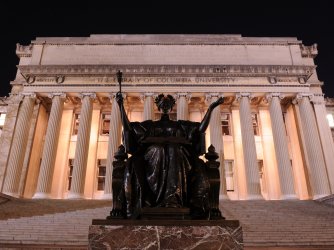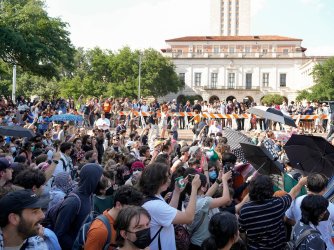Table of Contents
At Miami University of Ohio, Students Engage in Debate, Not Disinvitation

All too often, FIRE’s message—that engaging in meaningful debate with controversial speakers is more useful than censoring them—falls on deaf ears.
However, Miami University (OH) bucked the growing disinvitation trend by refusing to rescind its speaking invitation to columnist George Will, despite pressure to do so from students and faculty. By refusing to abandon its commitment to the marketplace of ideas, the university allowed debate to flourish on campus last night. This is welcome news, especially after Scripps College denied its students the opportunity to engage in meaningful debate by disinviting Will in response to his controversial column on sexual assault.
Will spoke to Miami students yesterday afternoon on the rise of progressivism in government, and after his speech ended, the floor was opened up to questions from audience members. As Emily Williams reports for The Miami Student, student Laura Uribe came forward and asked Will to explain and justify his statements on sexual assault:
She asked him again to clarify what he meant by victim “privileges.”
Will briefly referenced the attention that victims can receive before going into a description of his opinions on campus speech codes restricting First Amendment rights.
The audience enthusiastically applauded. Although she never felt her question received a clear answer, Uribe appreciated having a chance to contribute to the discussion.
“I was grateful to have the opportunity to ask my question as a way to challenge his beliefs and stand up for my own,” she said.
Uribe later told The Miami Student that “This is an issue that makes so many people uncomfortable. The more we talk about it, the more progress we will make.” By engaging Will in discussion, rather than silencing him, Uribe and her peers not only voiced their views, but allowed Will to defend his own. Although not all audience members were persuaded by Will’s argument, The Miami Student reports that “everyone left talking.”
It’s inspiring not only to see colleges refuse to bow to the demands of would-be censors, but also to see the important discussion that is enabled only by the free exchange of ideas between students and speakers—even (and especially) if those ideas are controversial.
Richard Campbell, former journalist and chair of the Media, Journalism and Film Department at Miami, was impressed by the discussion created by Will’s lecture and spoke to The Miami Student after Will’s speech. He said that although he disagreed with Will’s message, he would refuse to petition against Will’s invitation:
“I’m a believer in more speech, not less speech,” he said. “If he wasn’t coming, what would that accomplish?”
And students’ interactions with Will weren’t the only spurs for important discussions. In another example of answering speech with more speech, students engaged in protest long before Will’s lecture even began:
The nearer Will’s lecture approached, the larger the protesting crowd grew. Cars passing through the intersection honked their horns in affirmation, initiating satisfied cheers from the protesters. In lieu of signs, some young women held up T-shirts made for this year’s Clothesline Project, an annual display of shirts made by survivors of sexual assault in the community.
According to Alexis Doolittle, an intern at Miami’s Women’s Center, more T-shirts were made for this year’s project than ever before. She, along with Deanna Williams, another intern for the Women’s Center, handed out neon fliers with sexual assault statistics to everyone who passed through the crowd. They had been working to spread the word via email to student organizations about the protest. Even though they knew there were plenty of students at Miami who felt strongly about the issue, they were impressed by the turnout.
“It’s empowering; it really is,” Williams said.
FIRE commends George Will, Miami University, and the students who seized an opportunity for dialogue for reminding other schools that disinvitations only silence important discussions like these before they start. Last night’s experience at Miami proves that engaging in difficult discussions rather than censoring them empowers students.
Recent Articles
FIRE’s award-winning Newsdesk covers the free speech news you need to stay informed.

Campus encampment bans rarely violate the First Amendment. Here’s why.

University provosts have bleak outlook on free expression in higher ed

With colleges punishing student protesters, campus due process is more important than ever
